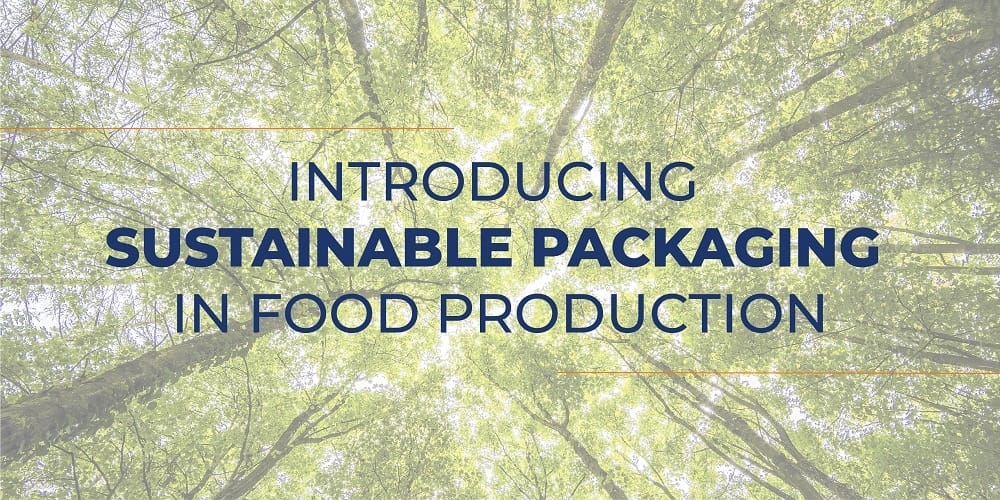
With climate change already causing disruptions in food and raw goods supply, sustainable business practices are more vital than ever and any business that has not started implementing more sustainability is already behind. Not only is it important for the health of the environment, but sustainable and environmentally friendly practices have a positive effect on consumers and workers alike. More than anything, consumers are now demanding sustainability from manufacturers and suppliers.
One major area where consumers demand more sustainability and accountability is packaging, particularly in foods. There’s a push for more recyclable, compostable, or otherwise environmentally packaging options, but there’s also the challenge of introducing new packaging processes while keeping the cost low for manufacturers and the end-user.
Here are a few options for introducing sustainable practices in the packaging process.
Less is More
Less is almost always more when it comes to packaging food products, especially for produce. Many produce suppliers are packaging bulk options in plastic-free or biodegradable packaging, making it easier for consumers to recycle. This is an excellent alternative to the common plastic mesh bags used to package citrus, onions, potatoes, and other bulk produce.
In the case of processed foods, there are continued innovations and experiments by some companies to package foods in as little packaging as possible. For example, squeezable containers and flexible packaging allow for less material to be used for the same amount of product.
Compostable Materials
Moving away from plastics toward biodegradable packaging material is another area where many companies are already investing. However, many biodegradable materials still require a special disposal process to actually break down properly. Consumers are also widely unaware of the differences in regular packaging and those that are biodegradable, so they do not know how to dispose of them properly.
The next step in sustainability is the use of compostable material for packaging. This means the material easily breaks down and can simply be tossed in the garden or compost bin when consumers are finished with it. An appealing result of using compostable materials is that it provides consumers a hands-on element to recycling.
Some companies are even creating compostable packaging with seeds bound into the material so consumers can plant their packages after consuming the food and grow their own flowers or vegetables, increasing the incentive to compost rather than add more into the landfills.
Reduce Microplastics
Studies are showing that microplastics are such a pervasive issue in the environment that they can be found nearly everywhere, even in the rain! While a portion of this is due to plastic material naturally breaking down over time into smaller and smaller pieces, it is also due to the way we manufacture certain plastic materials.
In packaging, microplastics are most often produced from plastic fibers used in textiles. While synthetic textiles are less frequently seen in food packaging specifically, plastic fibers are frequently used in bulk produce bags and even to package some cheeses or other dairy products.
Once again, moving away from plastic packaging materials altogether is an excellent solution to the microplastics issue. Companies can opt for the use of natural fibers for fabric materials or change to more biodegradable packaging.
Develop Full Eco-Lifecycles for Packaging
The benefit of fully recyclable packaging material is that is has the potential for manufacturers to create a full eco-lifecycle. This means sourcing material from recycled packaging, and ensuring the finished packaging is in turn recycled after the product is consumed.
A full lifecycle of packaging material offers several benefits for manufacturers, namely increased marketing value of their products. A mention that the package is made from post-consumer recycled content and that it is recyclable is a big appeal for consumers. Additionally, this process keeps plastics in use rather than continuing to add to landfills.
Responsible Sourcing of Material
Finally, whether your company is utilizing environmentally friendly materials or not, responsibly sourcing these materials has a significant effect on the company’s overall sustainability. Consumers like to see companies being transparent about their manufacturing practices, and showing that materials are being sourced in a way that does not negatively impact the environment or other communities can be a huge selling point.
Start Slow and Look Towards the Future
There are countless ways companies can make themselves more sustainable, and it can be overwhelming to get started. The important thing to remember is to start with small steps to slowly change practices towards sustainability. Changes won’t happen overnight. Set goals for the future, make efforts to work towards those goals and be transparent about it to consumers.
With the ever-changing economic environment, flexibility is key for every industry. With highly adaptable machinery and conveyance systems, businesses can maintain flexibility and change with the times to keep their market presence strong. Dorner is meeting this demand by providing customizable conveyor solutions and continuous support to help companies adjust their conveyance system to meet new product needs.
Sustainability is much more than a selling point in competitive markets, it’s something we can all do to help the environment today and in the future.





